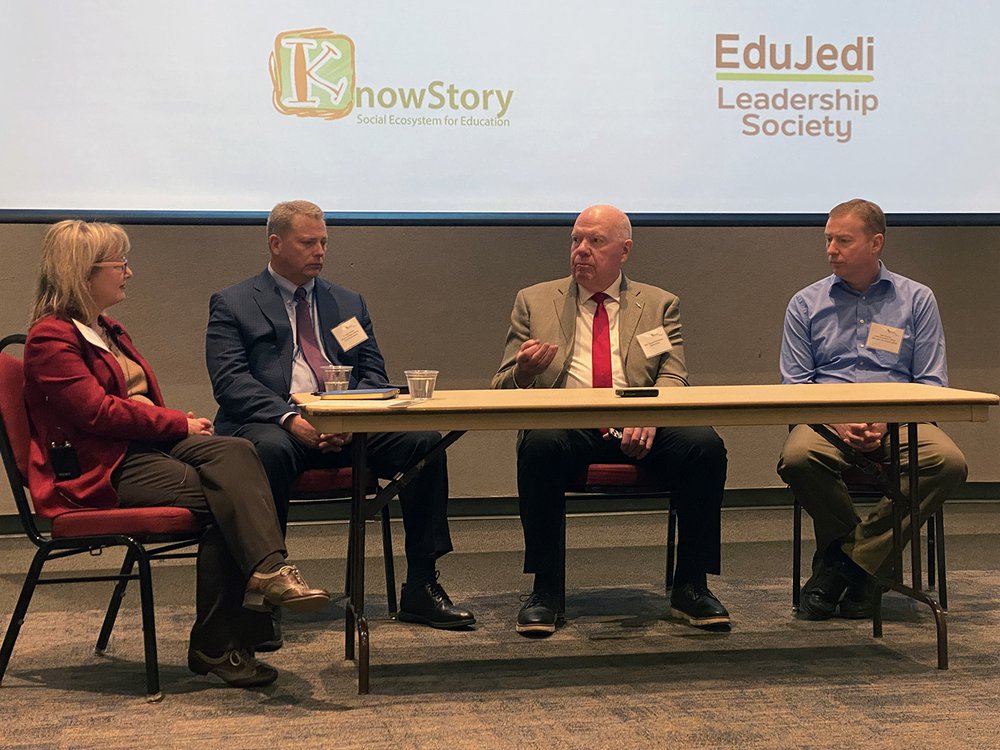The crown jewel in this year’s Salt Lake City area Digital Transition Event, was the Guest Administrator Panel Discussion, always a must-see event featuring some of the nation’s greatest education minds and some of the greatest ideas in education. This year’s discussion featured Senator Howard Stephenson, Retired - Utah State Senate, Sam Quantz, Chief Information Officer from the Salt Lake City School District, Bruce Cutler, Jordan Education Foundation STEM Advisory Chair from the Jordan School District, and Dr. Ryan C. Hansen, Director of Digital Learning from the Davis School District.
According to Dr. Hansen, "One of the things I think all parets love about what the pandemic did is it created more flexibility for the family. If a student wants to end their day early and go to work, or train athletically, there's lots of things that they can do. Maybe a later start because they moved their English class to an online class and we even have different options available for our kids as to what online looks like. There's an online classroom, there's an online independent study. There's, there's totally open ended online. And, so we can help kids find what works best for them. They can still keep the traditional experience, and then they can try online things as well.”
According to Senator Stephenson, “In Utah, we have had an opportunity for the legislature and the state board of education to work together on a digital teaching and learning master plan five or six years ago. And it was a collaborative effort. The legislature funded it, the state board of education themed it and the LEAs trained in it. So that teachers, though we didn't know COVID was coming, but better than any other state I think were able to hit the ground running because we had already trained the teachers in the effective use of computer assisted instructional software for 20 minutes, a half hour a day in math and that same period in English or reading. We've been recognized, as a state, the Education Commission of the States gave Utah its Frank Newman award for innovation and education because of the way we worked this out.”
“Our state superintendent SI Dixon,” continued Stephenson, “has received the Policymaker of the Year award, because of the team she brought together and the way they interfaced with the LEAs and enabled the LEAs to do their job more effectively. And so, we weren't caught flat-footed with the closures of schools in the spring of 2020.”
Chief Information Officer Sam Quantz, when asked about the structural shift he was seeing, said “The structural shift that I've seen is more of a paradigm shift prior to the pandemic. You look at technology in the classroom or in public education as a novelty, you'd see it in pockets. Maybe it was a whole school. Maybe it was an individual classroom, a specific student. But the pandemic really brought it out to the forefront, how much technology is needed. And now it's a cultural shift that is now an expectation, right? We're even talking about how it's an expectation that schools are ISPs, Internet Service Providers for students, right, where prior to the pandemic, that's the parent's responsibility. Our demand has increased 10, 20-fold on new software to review, new devices, new technology, just to meet the increased demand of what the pandemic's brought on.”
According to Cutler from the Jordan School District, “The tech really becomes the extension of a great teacher, and teachers will never be replaced. I think for the 2022 teacher, one of the challenges is there are no shortcuts with the technology. And so, the technology requires planning. It requires the thoughtful placement of resources. And maybe the 2024 teacher that uses tech, it, it does make the job a little bit easier, but that's not necessarily the case in 2022. But when we effectively do that, it magnifies the impact that a teacher can have, or that the, the teacher does have, it can be more kids. It can be the same amount of kids, but deeper.”
Utah is a state that leads the nation in the use of technology, and these guest administrators eagerly share what they have learned, prior to the pandemic and throughout the COVID challenge. Utah, like other states, changed its thinking and culture around technology and education in general, due to the changes forced by the Coronavirus. Utah learners are better because of it, and you’ll want to catch every word from these Utah these thought leaders.











